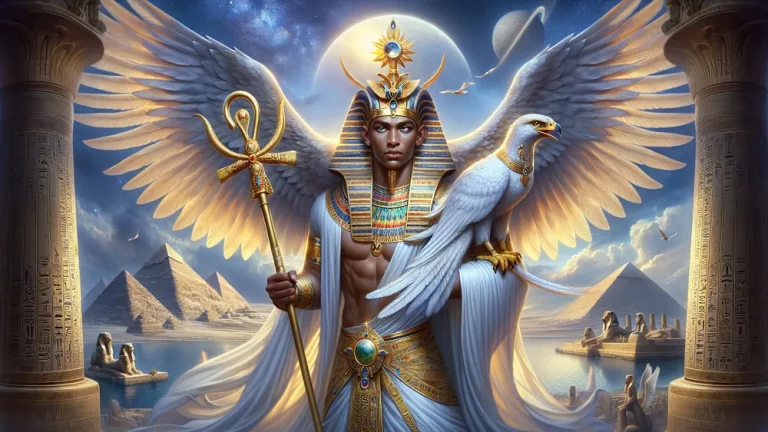Oedipus: Greek Mythology’s Tragic King Who Killed His Father
Welcome to the interesting realm of Greek stories, where tales about gods, heroes, and tragic folks have caught people’s interest for ages. One person who stands out is Oedipus, a name that means fate and sadness. If you can picture being told right at birth that your life would stick to a set path, much like a present-day forecast that dictates your every move, then you get what Oedipus’s story is all about.
Key Points:
- Oedipus is a tragic figure in Greek myths.
- He was born to King Laius and Queen Jocasta of Thebes.
- A prophecy foretold he would kill his father and marry his mother.
- Abandoned at birth, he was adopted by King Polybus and Queen Merope of Corinth.
- He unknowingly fulfilled the prophecy by killing Laius and marrying Jocasta.
- His tragic discovery led to Jocasta’s suicide and his own self-blinding.
- Oedipus’s story explores themes of fate, free will, and tragic outcomes.
His story kicks off with a cold prediction and rolls into a string of events that are both unusual and heartbreaking. When we explore Oedipus’s life, you find how a prediction from the Oracle of Delphi set up a life full of unintended patricide and an unplanned incestuous marriage.
This intro gives you a sneak peek into the main parts of Oedipus’s tale, setting up a deeper look into his family background, the prediction that shaped his future, and the sad outcomes that followed. Whether you’re a newbie to Greek stories or an old hand, checking out Oedipus’s life is bound to be both informative and interesting.
Oedipus: Overview and Key Facts
| Key Point | Description |
|---|---|
| Name | Oedipus |
| Parents | Son of King Laius and Queen Jocasta of Thebes |
| Adoptive Parents | He was brought up by King Polybus and Queen Merope of Corinth |
| Prophecy | The Oracle of Delphi said he’d kill his dad and marry his mom |
| Early Life | Because of the prophecy, he was abandoned at birth but later adopted by the royal family of Corinth |
| Key Events | He solved the Sphinx’s riddle, and then he became King of Thebes. He unknowingly fulfilled the prophecy |
| Marriage | He married Jocasta, his real mom, meaning the prophecy came true |
| Sad Realization | When he found out who he was, it meant Jocasta killed herself and he made himself blind |
| Significance | A main person in Greek stories, representing fate, choice, and sad endings |
Getting to Know Oedipus
To really get the sad story of Oedipus, first, let’s look into his beginnings and his early life. This made way for the prophecy that would control his future.
Oedipus’s Family Background and Early Days
Oedipus was born to King Laius and Queen Jocasta of Thebes, a significant city-state in ancient Greece. King Laius, kin of Cadmus, the founder of Thebes, was a respected ruler, and Queen Jocasta was known for her beauty and wisdom. But, their union had a scary prediction over it.
The Oracle of Delphi, known for divine predictions, said their son would grow up to kill his dad and marry his mom. This fearful forecast cast a shadow over Oedipus’s birth, so his parents made a painful choice trying to stop fate. To avoid the prophecy from happening, King Laius and Queen Jocasta decided to leave their newborn son.
They pierced Oedipus’s ankles and left him on Mount Cithaeron to die, hoping nature would take its course. However, fate had different plans. A shepherd saw the baby and felt sorry for him, eventually taking him to the court of King Polybus and Queen Merope of Corinth. The royal couple, unable to have children, adopted Oedipus, raised him as their own son, and didn’t know about his real parents.
This kind act set up what the prophecy said, as Oedipus grew up not knowing his beginnings and the future waiting for him.
Oedipus was abandoned by his parents to avoid a prophecy that he would kill his father and marry his mother, but he was rescued and raised by another royal couple unaware of his true origins.
The Foretelling
To get the whole effect of Oedipus’s life, we need to look more into the prophecy that started his sad destiny.
Where the Prophecy Came From
The prophecy that changed Oedipus’s life came from the Oracle of Delphi, a critical religious site in ancient Greece. The Oracle, a priestess called the Pythia, was thought to talk directly to the god Apollo. She gave important messages and saw the future.
When King Laius and Queen Jocasta went to the Oracle, they heard a terrifying prophecy: their newborn son, Oedipus, would kill his dad and marry his mom. This was not just any prediction; it was a serious and scary warning that would influence every decision Oedipus’s parents made.
Imagine being told such terrible things about your child – it’s almost like a fortune teller today saying a terrible event will happen in your family, leading you to take extreme actions to stop it from happening. This prophecy started the sad events in Oedipus’s life, as his parents took drastic steps to avoid its outcome.
How the Prophecy Shaped Oedipus’s Life
The prophecy given by the Oracle of Delphi had a big effect on what Oedipus’s parents did, King Laius and Queen Jocasta. They received a scary prediction that their son would kill his dad and marry his mom, so they took big steps to stop this. They decided to leave their newborn son, pierced his ankles, and left him on Mount Cithaeron to die.
Because they were trying hard to beat the prophecy, they made this desperate choice, much like modern parents might do anything to stop a predicted disaster from happening. However, what they did accidentally started the prophecy, as Oedipus was found and adopted by another royal family, leading him down a path that would eventually fulfill the Oracle’s words.
As Oedipus grew up, the prophecy continued to shape his life in ways he couldn’t have expected. Oedipus, who grew up with King Polybus and Queen Merope of Corinth, didn’t know his real parents. When he later went to the Oracle of Delphi himself to ask about his origins, he got told the same prediction: that he would kill his dad and marry his mom.
Wanting to avoid this awful fate, Oedipus left Corinth, thinking that Polybus and Merope were his real parents. Ironically, this decision, meant to escape the prophecy, led him straight to it. His journey took him to Thebes, where he unknowingly killed his real father, King Laius, and later married his mom, Queen Jocasta.
The prophecy’s effect was unavoidable, showing the powerful and often sad role of fate in Greek mythology.
Oedipus’s Path and Destiny
Since the prophecy hovered over his life, Oedipus’s journey was filled with several key events that would end tragically.
Oedipus Gets Adopted and Grows Up
After they left him on Mount Cithaeron, Oedipus was found by a shepherd who felt sorry for the baby. The shepherd brought him to King Polybus and Queen Merope of Corinth, who had no children and really wanted to adopt. They named him Oedipus, which means “swollen foot”, because of the injuries on his ankles. He was raised as the prince of Corinth.
Oedipus grew up in a caring and loving environment. He did not know about his real origins. Imagine today if a child, adopted by loving parents, grows up thinking they are his real parents. This comparison helps us see how much Oedipus did not know about his true identity and the love he got from Polybus and Merope.

There were key parts of Oedipus’s upbringing and the effect of his adoptive parents, like:
- Learning and Schooling: Oedipus got a royal education, learning how to govern, fight in wars, and understand philosophy to prepare for being a king someday.
- Parental Love and Advice: Polybus and Merope gave Oedipus lots of love and advice. They influenced how he thought and acted.
- Not Knowing His Real Parents: Even though he had a privileged upbringing, Oedipus did not know who his biological parents were; he thought Polybus and Merope were his real parents.
- Visit to the Oracle: When he was older, Oedipus went to the Oracle of Delphi to ask about his origins, which started him on the path that would make the prophecy come true.
These things show the big role that King Polybus and Queen Merope had in Oedipus’s life. They shaped him into the man he would become, while unknowingly pushing him towards his sad fate.
Oedipus Meets Laius
As he traveled away from Corinth, Oedipus had a significant meeting with King Laius at an intersection, a place often meaning important choices in stories. Oedipus wanted to avoid fulfilling the prophecy, so he left Corinth. At the same time, Laius was traveling to Delphi to ask the Oracle something. Both men did not know they were father and son.
They argued over the right of way, and it quickly turned violent. In anger and self-defense, Oedipus killed Laius and his men, except for one who got away. This sad event was important, much like a road rage incident today that goes out of control, causing unexpected and serious effects.

Key parts before and after this meeting:
- Oedipus’s Departure from Corinth: He left Corinth to try to escape the prophecy.
- Laius’s Journey to Delphi: Laius was going to ask the Oracle something, not knowing he would meet his son.
- The Dispute at the Intersection: A minor argument over the right of way quickly became violent.
- The Result: Oedipus continued his journey, not knowing he had killed his real father. The surviving servant went to Thebes to tell about what happened.
These parts show the sad irony of Oedipus’s actions. His attempt to avoid the prophecy caused him to fulfill it directly. Meeting at the intersection started events which would eventually show the sad truth about his parents.
Oedipus unknowingly killed his father, King Laius, during a violent argument at an intersection while trying to escape a prophecy, setting off a chain of tragic events.
Cracking the Sphinx’s Riddle
When he got to Thebes, Oedipus met the Sphinx, a legendary creature with the body of a lion, wings of an eagle, and a woman’s head. The Sphinx was scaring the city by asking everyone a riddle who tried to get in: “What walks on four legs in the morning, two legs at noon, and three legs in the evening?
If they answered wrong, they were eaten. Oedipus, using his sharp mind, said “Man,” explaining that people crawl as babies, walk on two legs when they grow up, and use a cane when they are old. With this right answer, the Sphinx destroyed itself and freed Thebes from its curse. Think of solving a hard puzzle that nobody else could, which means you get a lot of respect and a big reward.
Because of his win, Oedipus was seen as a hero and was given the throne of Thebes and the hand of the widowed Queen Jocasta, thus unknowingly fulfilling another part of the prophecy.
Oedipus Marries Jocasta
When he solved the Sphinx’s riddle and freed Thebes, Oedipus was given the throne and the hand of Queen Jocasta, the widow of the recently dead King Laius. Unknown to both Oedipus and Jocasta, they were mother and son, fulfilling the serious prophecy foretold by the Oracle of Delphi. The people of Thebes celebrated their marriage, seeing Oedipus as a savior and strong leader.
Consider a situation where hidden family secrets cause an unexpected and sad union, showing the dramatic contradiction in Oedipus’s story. This marriage, seen as a good thing at first, was really a problem that would soon disrupt their lives. The importance of Oedipus and Jocasta’s marriage went beyond their own lives, affecting the whole city of Thebes.
Their union brought some stability and wealth to the city because Oedipus was a wise and fair king. However, the hidden truth of their relationship cast a dark shadow over the city. Fulfilling the prophecy meant that Thebes was living on borrowed time, with the truth about their real identities threatening to cause chaos.

This union was both a sign of Oedipus’s success and the start of his ultimate fall, showing the unavoidable nature of fate in Greek mythology.
The Fallout and the Big Reveal
While Oedipus and Jocasta kept ruling, their past secrets started to come out, which led to a series of terrible discoveries.
The Plague and Finding the Truth
Thebes was hit by a terrible plague that caused lots of pain and death, leaving the city in a state of hopelessness. Oedipus, being king, felt he had to save his people and bring back order. So, he asked his brother-in-law Creon to go ask the Oracle of Delphi what to do. The Oracle said that the plague was a divine punishment for the unsolved murder of the old king, Laius.
Imagine today’s leader facing a hard public health problem and asking experts to find the cause, only to learn the answer lies in fixing an old, hidden problem. This led Oedipus on a determined mission to find the killer and punish them, thinking that handling this would lift the curse from Thebes.
Oedipus’s mission to find the truth meant he kept looking for answers non-stop. He asked many citizens, talked to prophets, and even called the blind seer Tiresias, who at first didn’t want to tell the bitter truth. Oedipus’s drive to find out what caused the plague was like a detective working on a tricky case, putting together clues to find the hidden links.
As he searched more, Oedipus started finding hints about his own past that made him more and more uneasy. His mission wasn’t just about saving Thebes but also about facing the core of who he was, leading to the final big reveal of his true origins.
The Big Discovery
While Oedipus searched for answers about the murder of King Laius, he pieced together the parts of his own past. The turning point came when a messenger from Corinth arrived, bringing news of King Polybus’s death and saying Oedipus was not the real son of Polybus and Merope.
This news was like finding out you were adopted and that your real parents held a dark secret. Digging further brought Oedipus to the shepherd who found him as a baby, left on the mountainside. The shepherd confirmed that Oedipus was the son of Laius and Jocasta, meaning he had both killed his father and married his mother.
This horrible news broke Oedipus’s world because the prophecy he tried to avoid had come true in the worst possible way.
The effects of this news were quick and terrible. Jocasta, upon learning the truth, took her own life out of shame and horror. Oedipus, filled with grief and guilt, blinded himself as punishment and gave up the throne. The city of Thebes was left in chaos, trying to deal with their king’s tragic fate. To help understand the key news and their effects, here is a summary table:

| Key News | Effect |
|---|---|
| Oedipus is not the son of Polybus | Breaks Oedipus’s sense of self |
| Oedipus is the son of Laius and Jocasta | Fulfills the prophecy and reveals the truth |
| Oedipus killed his father, Laius | Proves the Oracle’s prophecy |
| Oedipus married his mother, Jocasta | Leads to Jocasta’s suicide and Oedipus’s self-blinding |
These news items did not only fulfill the prophecy but also ended Oedipus’s rule tragically, leaving Thebes to deal with the results of these shocking truths.
Symbols and Ideas
Oedipus’s sad story is full of symbolism and ideas that look deeply at the human state and fate. Since it includes such deep topics, it makes us think a lot.
Destiny vs. Choices
Oedipus’s story is a deep look at the struggle between fate and free will.
In Greek stories, fate is seen as something you can’t escape, set by the gods, and out of people’s hands. Oedipus’s life means this well, as he tries to get away from the prediction told by the Oracle of Delphi – that he would kill his father and marry his mother – but ends up making it happen by trying to stop it.

Picture being told a specific future event will come to pass for you, and no matter what you do to prevent it, you cause it to happen. This paradox means the old Greek belief in the power of fate, suggesting that no matter how much one tries to change their future, it’s still unavoidable.
Oedipus’s decisions, driven by his wish to beat fate, lead him right into the path set by the prediction, showing the complex mix between human choices and set outcomes.
Oedipus’s tale highlights how trying to escape fate can actually lead to fulfilling it, demonstrating the tricky balance between our choices and what is destined to happen.
Seeing and Understanding
The theme of being blind and seeing in Oedipus’s story is a strong idea that shows the topics of knowing and not knowing.
The blind prophet Tiresias, who has the wisdom to understand the truth about Oedipus’s past and future, is very different from Oedipus himself, who can see but is blind to his own reality. It’s like having all the facts in front of you but not seeing what they mean until it’s too late.
Oedipus finally making himself blind is a clear example of his path from not knowing to knowing. By doing this to himself, Oedipus admits the hard truth he couldn’t see before, which shows the idea that real understanding often has a big personal cost.

This mix of being blind and seeing in the story highlights the tricky relationship between seeing and understanding, suggesting that just because someone can see, it doesn’t mean they truly understand.
Pantheon of Greek Mythological Heroes and Figures
Greek stories have a wide range of characters, each with their unique tales and qualities. From Hercules, who had great power and twelve big tasks, to the cunning Odysseus, whose cleverness was key in the Trojan War and his long trip home, these characters have fascinated people for centuries.
If you’re curious about many of these interesting characters, you can look at this comprehensive list of all the Greek Mythological Heroes and Figures. This resource gives a lot of information on each character and helps us understand their roles and their importance in the stories.
FAQs
1. Who were Oedipus’s real parents?
Oedipus’s real parents were King Laius and Queen Jocasta of Thebes.
2. What was the riddle of the Sphinx?
The riddle of the Sphinx was, “What walks on four legs in the morning, two legs at noon, and three legs in the evening?
3. How did Oedipus discover his true identity?
Oedipus discovered his true identity through a series of investigations that revealed he had killed his father, King Laius, and married his mother, Queen Jocasta.
4. What is the significance of Oedipus’s story in Greek mythology?
The significance of Oedipus’s story in Greek mythology lies in its exploration of fate, free will, and the tragic consequences of human actions.







